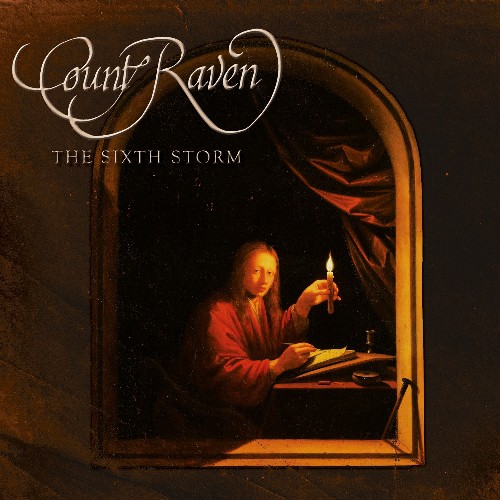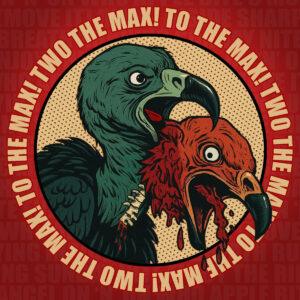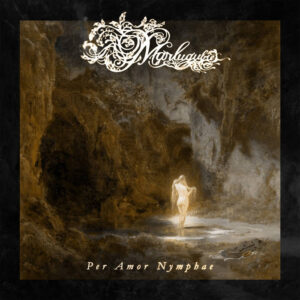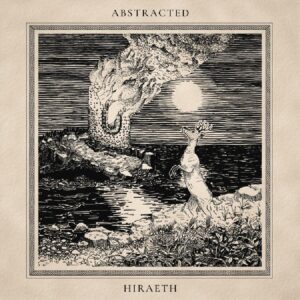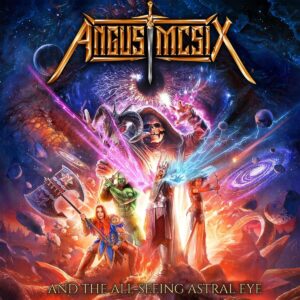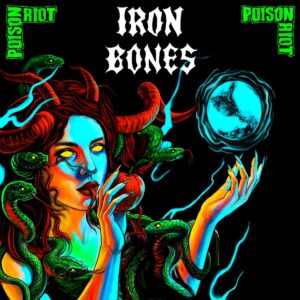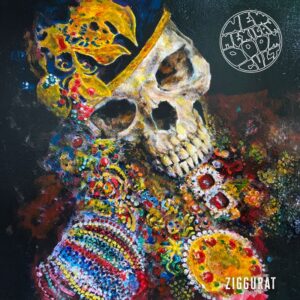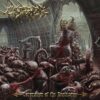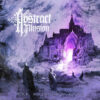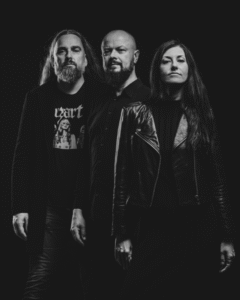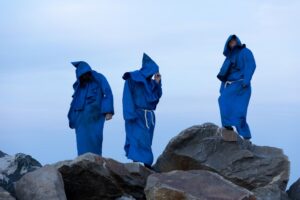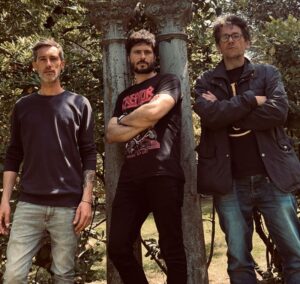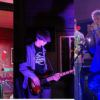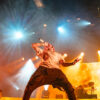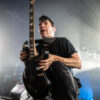Samuel Cornelsen
Count Raven
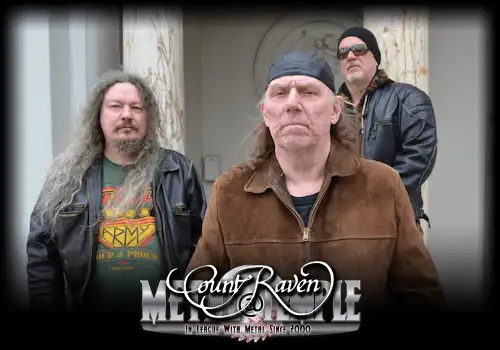
Very well, thank you. I'm glad we finally have the album out after over 2 years in the making!
We started rehearsing the new songs when I joined the band in 2016. At the same time, we rehearsed the old songs for upcoming gigs. It took some time to get everything together, finding the right record label and so on, but I have to say it's very nice to see that the hours, and effort that I have put into the band has paid off.
I think there was doubt of the band's future after (bass player) Wilbur left. But when I joined, I started working on the social media presence, and things started happening. We were offered some really good gigs, like Hammer of Doom in Germany and Fall of Summer in Paris - from then on the Raven took off again.
It's much easier than that. My original idea was to call it "Baltic Storm", after one of the tracks. But then around a year ago all this media attention arose around the sinking of the ship Estonia back in 1994, which is what the song is about – all the lives lost and how to deal with the grief, the loss of your loved ones, and so on.
The media reported new findings, new video material of holes in the hull, which seem to come from an explosion inside the vessel etc. We felt we didn't want to be associated with that as it is a very serious and sensitive matter. And this is said with the utmost respect for all the people that lost their lives, and their respective families. God rest their souls. It was an event that truly shattered Sweden and a few other nations in the process. We did not want to go down that avenue and try to gain attention from it. I'm speaking about it now, but only because we are being asked about it.
My next idea was to call it "Chapter 6" as it is the sixth album, and also in relation to the cover - it looks like the young man on the cover is writing in a book, or a journal of some sort. But our record company informed me that "Chapter 6" has already been used by another very well known Swedish doom band, and of course I own that CD; I was just not thinking, haha! So the record company suggested that we combine my title ideas and call it "The Sixth Storm". It's as simple as that!
Well, Dan wrote all of the lyrics so I can't really go into that much detail. But I will say that sometimes songs are told as a story; it is not necessarily an opinion. It could be the opinion of the person in the song, but not necessarily one that is reflective of the writer.
Sometimes the lyrics describe an historical event; "Oden" is an example of that. It does not take a stand against Christianity as someone suggested; it is a story told by a person with Ásatrú (Northern religion, Norse Gods) beliefs. Lyrics are what they are - they are there to tell a story. Sometimes a not very nice story, but also sometimes one that does not actually reflect reality, whatever "reality" is.
I think the song "The Curse" is a good example of that, when it deals with social media and the fake culture behind it. I mean, anyone can pretend to be anyone on social media, if you know what I mean? Ironically, we rely a lot on Facebook and Instagram to reach out to our audience. I think it's fine if used carefully, but it can also be very deceptive. And I think, especially for young people with little or no life experience, it can be easy to get sucked into a world which does not exist.
I think that is definitely something for the listener to decide. We do not tell people what to do or think - it would be preachy and audacious. Everyone interprets the music and lyrics individually, and that's the beauty of it, don't you think? Individuality is strong, and perhaps that is a message we want to convey. But there is no solution offered other than the one that you as a listener can think of.
I found the painting at a portrait museum (Nationalmuseum) here in Stockholm about three years ago. The painting is called "Young Man writing by Candlelight" and was painted by Dutch artist Toussaint Gelton in 1663. I saw it by chance and just said out loud to me and my partner (who also shot the band photos for the album, by the way) "That's the next Count Raven album cover!" It was an immediate revelation that this is it, we have to have this on the cover! I got in touch with the museum and got the license to use it, it's important to me to do things the right way and gain all permissions. In any case, we do not know who the young man is or what he is writing. If you think it's the Blood Pope, go for it, we are happy with any suggestions or people's own interpretations. But for us, he has no relation to any of the songs. Yet he is still relevant to the album as a whole.
Personally, I have been playing music on and off for 30 years. I've been in loads of bands, playing loads of different styles. That being said, I love the heavy riffs, and to me, Black Sabbath is of course the ultimate doom band. There are others that are very good though; Saint Vitus and Egypt for example. But I'd especially like to give a shout-out to a Swedish band called Dautha. For me, it is up there with Black Sabbath, the absolute best doom you can imagine. I urge anyone and everyone that is into doom to check out Dautha.
To get back to the question, we do not write songs in a certain style to fit in. We write in the concept of Count Raven, and that is in a certain style. Of course, we are influenced by Black Sabbath, but in no way, shape or form trying to copy anything. When I'm at home with my guitar in my home studio, I write whatever comes to mind – sometimes it's a Gary Moore-style instrumental, sometimes it's a 10-minute stoner song influenced by Sleep, or Kyuss, for that matter. Sometimes it's an AC/DC-ish riff that comes out. I'm giving you these references so you can get an idea about my influences. There is never an intention to copy anything. I record all my ideas; some of them might be on the next Count Raven album but most definitely, most of them won't!
There wasn't really any clear, or predestined, change. The songs were already written when I joined; there might have been a few tweaks in the arrangements here and there. The big job, with the pre-production and recording, was to select what songs we were going to put out. A lot of work went into that, as we actually rehearsed 6-7 more songs that easily could have made the album, at the expense of a few others of course. A few of them will probably be on the next one.
I didn't contribute much to the songwriting. For me it was more to overlook the whole creative process – selecting and compiling the track list, working with our designer to get the cover the way we wanted it to be, listening to mixes and so on. Also, discussing with the record company on when and how to release it. As you might know, the vinyl production times are just silly. We sent the CD, cassette and vinyl off to their respective factories at the same time. The CD and cassette took about 4 weeks to manufacture while waiting times for vinyl is up to eight months! So we had to decide, do we release the CD now or wait until March/April 2022 and release CD and vinyl at the same time? There was a lot of stuff like that to consider. The whole process did teach me a lot, but it's hard to pinpoint something in particular. I would say for me to overlook the whole album's creation was an eyeopener – there are so many things you have to be aware of.
Not much really, the only thing that comes to mind is that Dan wasn't able to go to the studio to record his vocals, because of the Covid restrictions. The basic tracks were recorded at the Endarker Studio, which is about 2 hours south of Stockholm. Endarker is run by Magnus "Devo" Andersson, who used to be the bass player in Marduk. He is an absolute gem and we'd love to work with him again. The vocals were to be recorded at a more local studio to save on travel time and hotel costs, but Dan ended up building a home studio instead, because he couldn't go to the local studio. In the end, it worked, but it took way longer than if we'd been at a normal studio.
The bit that (I think) you are referring to is actually not the chorus, it's just the middle part. It is an absolutely stunning part of the song, and an extremely powerful vocal performance from Dan, together with some eerie sounds added by Devo, but there was never any intention to do it twice. I think you would have lost the effect by repeating it.
"Baltic Storm" is one of the oldest tracks, I think Dan wrote it even before "Mammons War". Like I said before, it deals with loss and grief, as Dan and his children knew a few people who perished in the 1994 Estonia disaster. It also has that atmospheric middle part, just like "The Ending". I think it's a very powerful track with relentless riffing; when we come back to the main riff after the mid-part, it gives me goosebumps! It was never one of my personal favourites on the album though, but it has popped up in quite a few reviews as a stand-out track. So the track obviously is a very integral part to the album.
Again, it was written way before I joined. I see no relation to "Changes" though, there is obviously something there you have picked up on (which is good - as I said before, we like people's own interpretations). This is one of those atmospheric pieces Dan has always put on the records as a little breather. I remember being in the car with drummer Jens Bock and he had a CD with old (unreleased) Count Raven demos. "Heaven's Door" was on it and I immediately thought it needed to go on the album - I loved it, especially Dan's lyrics which are as always open to interpretation. I asked Dan for the master tape so we could re-mix it but he ended up recording the whole thing fresh. It's one of those in-between pieces that is essential to a Count Raven record.
I cried my eyes out when I first heard it, which is when we got the first mix! Dan recorded it completely on his own in a couple of days and didn't even tell us about it. It's obviously about his life partner of over 40 years that sadly passed away in September of 2019. A hard track to listen to, and even though I think Dan wrote it as therapy, we felt that it needed to go on the album as a tribute to Kristina, or "Kicki", as she was known for. Dan experimented a lot on this track, he bought new synth sounds, new strings, new piano and so on. He went all-out classical!
About the future of Count
Raven, can you say that the band is truly back in the fold? Will there be live appearances in the coming future? Can we expect new material to come out, and not after another 12 years?
We are already planning more releases. There is definitely more coming out in the next couple of years. For live performances, we do not know yet as Dan has had a heart problem. He needs to be 100% fit first, before we start planning gigs.
Thank you so much Lior for your interest in the band - we are humbled!

More results...
